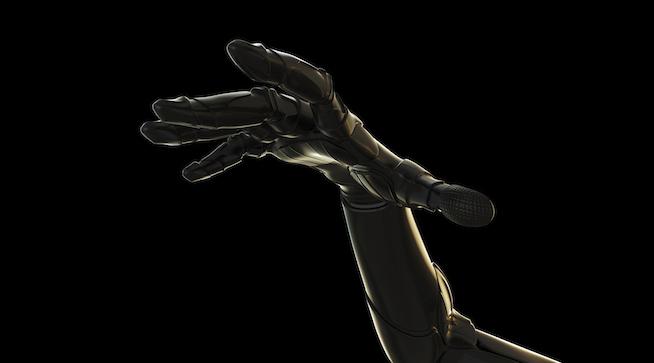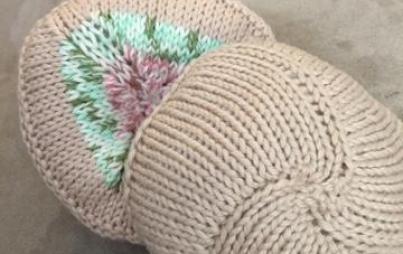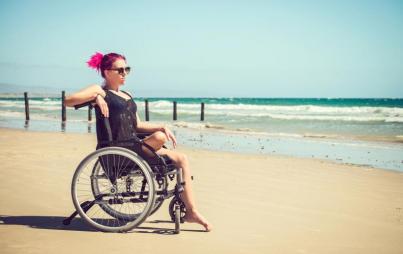
The thing about having only one real hand is that it's an awful lot like having two hands. I've never found anything it prevented me from doing other than eating eggs and toast at the same time.
The use of 3-D printing technology for prosthetics has been heralded as "life-changing" for individuals born without limbs. Even Iron Man has gotten on board by delivering a 3-D printed hand to a young boy in a video that quickly went viral.
The idea behind these campaigns is that access to inexpensive prosthetics improves the quality of life for disabled individuals, and particularly for those who would otherwise be unable to afford them. It's a noble idea, but it relies on a flawed premise — that everyone without a limb can benefit from and wants a prosthetic limb replacement. Or, to be blunt, it's founded on ableism.
I was born without fingers on my right hand. No one knows why, even now, 36 years later. It just happened, as these things sometimes do.
My mom told me that I spent most of my infancy reaching for things with my right hand and then screaming in frustration when it just didn't work. Eventually, though, I simply began to reach for things with my left hand.
The thing about having only one real hand is that it's an awful lot like having two hands. I've never found anything it prevented me from doing other than eating eggs and toast at the same time. Now that I eat paleo, I don't eat toast anymore so even that minuscule problem is solved. My life with one hand is pretty much exactly the same as my life would be if I had two hands.
Except, of course, for dealing with other people. People are always a mixed bag. Some stare, some ask intrusive questions, some pretend not to notice, and some actually don't notice. (Including a man I dated who noticed about three months into the relationship! That was awkward.)
As a young child, I was pretty comfortable in my own skin. But, eventually, the stares and the questions made me realize that there was something "wrong" with me. My missing hand wasn't just different, it was undesirable. It was less than.
As I got older, I became incredibly self-conscious. I tried to avoid shaking hands and I hid my hand in my pocket as I walked. I became desperate to fit in. I wanted more than anything to be normal.
When I began the process of being fitted for a prosthetic hand as an adolescent, I was ecstatic. Finally, I would have two hands. Finally, I would be just like everyone else! My parents drove me to the hospital three hours away for fittings and, eventually, it was ready.
My prosthetic wasn't fancy. It was a simple, hard shell that fit over my wrist and arm, and was connected to a strap that wrapped around my back and fit snugly around my left shoulder. The "hand" itself was interchangeable: I could use either a shiny metal hook or an awkward beige hand. Either one was operated by shrugging my left shoulder, which resulted in a simple open and shut of the right "hand."
I hated my prosthetic hand almost immediately. It was uncomfortable, warm, and sweaty. It was similar to wearing a cast. I quickly realized that it was easier to use my own fingerless hand than the prosthetic, and that the prosthetic failed entirely at its primary purpose — helping me fit in.
As abnormal as it is to have only one hand, there is nothing less normal than wearing a plastic arm on top of your own. It looked and felt far more awkward than my own hand ever had, and it also removed my ability to feel with my hand. It didn't provide a single benefit, and I stopped using it almost immediately.
For most of my early adulthood, I still wanted a hand. Not that awkward prosthetic, of course, but perhaps a hand transplant or a hand grown in a lab. I was open to almost anything science could throw at me, and my goal was not to gain function, but to gain normalcy. If it looked normal, I would have been willing to try it.
These days, I take a different view. I'm too old to care much about being "normal" or "fitting in" anymore. I've gotten used to my hand, and to the often uncomfortable responses to it. I don't know what I would gain from having even a perfect right hand, much less another awkward prosthetic, and for the first time in my life I'm not very interested in changing my hand.
While the bionic hands being 3-D printed now are a far cry from my own simple prosthetic, they still rely on the same idea that someone born without a hand is in need of a replacement. If the boy Iron Man presented a bionic hand to is anything like me, he has probably already learned how to live his life just fine — even without an expensive robotic hand.
While my experience with a congenital limb deficiency is different from that of an amputee, I wonder whether they, too, would adapt to limb loss if they were supported and encouraged to believe that their new bodies were still functional and whole, rather than pushed to consider prosthetics.
Ultimately, deciding whether to use a prosthetic is an individual and personal decision. But when children are told that robotic limbs will make them "superheroes," it is the parents and doctors who are making the choice, not the kids themselves. Our kids don't need to be "superheroes," they just need to know that they are whole, they are loved, and they are good enough — no matter how many fingers or toes they have.





